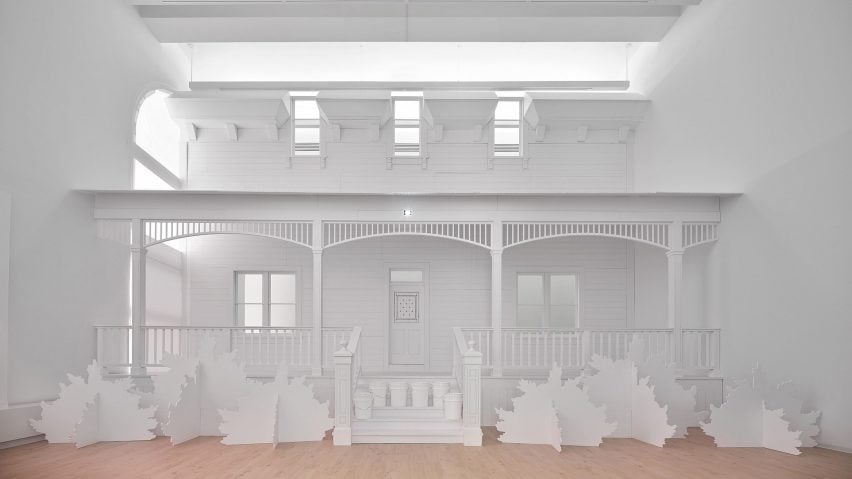Production designer Ruth De Jong has installed a house modelled on her set design for Jordan Peele's film Nope at the Chicago Architecture Biennial as part of a series of installations exploring horror and architecture.
The installation is a life-size recreation of the facade and front porch of a ranch home featured prominently in the movie and explores "architecture's cinematic function as a character of its own," according to biennial curators The Floating Museum.
It consists of a facade facing a large screen depicting a looped landscape scene from the horror movie, in which a UFO descends upon a family ranch.
De Jong covered the house in a monochromatic white, save for red movie blood placed in buckets on the front steps.
The installation was placed on the third floor of the Chicago Cultural Center, where many of the biennial exhibitions were placed.
"Set designers think about imagined architecture versus the actual architecture," said the Floating Museum.
"Horror and beauty are both aesthetic paradigms that attune your mind, and for Jordan Peele horror is not just the monster underneath the stairs or in the wall, but structural – which is why it doesn't have a time of day and does not have a limited space."
The unfinished facade plays on set design, in which architectural elements like houses or apartments are often incomplete and the viewer's tendency to subconsciously fill in the gaps.
"Our minds actually finish out the architecture," said the team.
The installation is part of a series that explores the horror of property ownership and expropriation. In an adjacent room, The Buell Center and architecture studio AD–WO created an installation called 100 Links: Architecture and land, in and out of the Americas.
100 Links features a canopy of surveyor chains that were used in the divvying up of land in the Americas, suspended from the ceiling and surrounded by troughs holding books that explore ideas of architecture and the methods of land expropriation.
Ruth De Jong is a production designer who has previously worked on movies such as Oppenheimer (2023, dir. Christopher Nolan) Us (2019, dir. Jordan Peele), and TwinPeaks (2017, created by David Lynch and Mark Frost).
Other installations on view at this year's Chicago Architecture Biennial include an array of works in the postmodern Thompson Center and a spiral of bio-bricks made of algae by SOM.
De Jong's installation will be on view from 1 November to 11 February at The Chicago Architecture Biennial. For more events, exhibitions and talks in architecture and design around the world visit the Dezeen Events Guide.
The photography is by Tom Harris.

